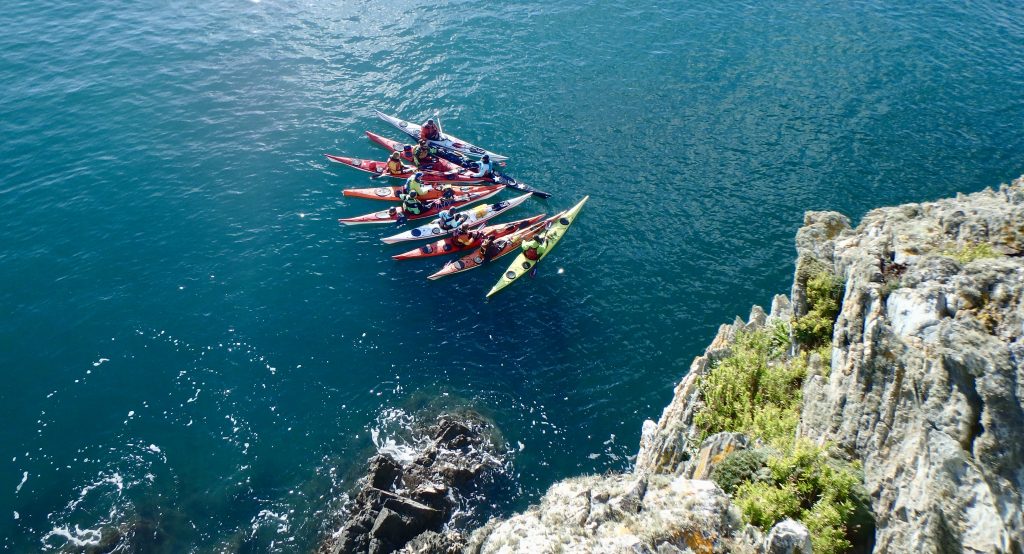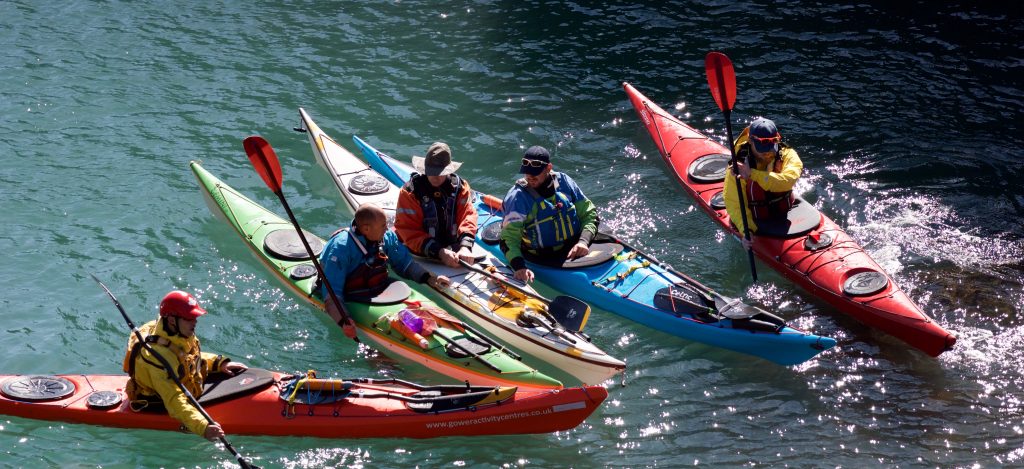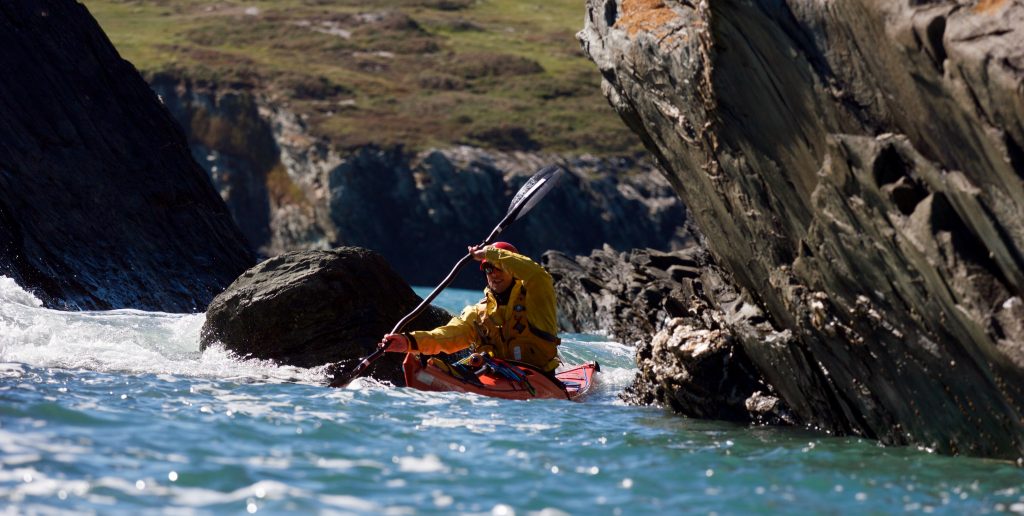Last year we asked our clients to send us advice on preparing for a sea kayak leader assessment (moderate or advanced water). We asked them to tell us the steps they took to gain skills and confidence leading others on the sea.
Our clients are the experts: they did the hard work to prepare for their assessments, and reaped the rewards.
Who better to turn to for advice?
These are their answers, with our own observations added below each section.
ADVICE #1
- Be clear about your reasons for wanting to lead on the sea…
- If it is for fun? i.e. you don’t need to do this for work – don’t lose sight of that…
- If you stop enjoying paddling, review your strategy…
- Be certain that you want to look after other less-experienced kayakers in moderate / advanced sea conditions…
- This is a very different challenge to simply paddling in such venues with other comparably-experienced kayakers…
Ask yourself: why do I want to lead other sea kayakers in moderate or advanced conditions?
– are you motivated to develop the confidence and ability of other sea kayakers?
– are you seeking validation of your ability, to establish that you are ‘good enough’?
There are many reasons why people might choose to lead others on the sea – it is important to know why you want to take on this responsibility.
Many sea kayakers select the goal of completing the British Canoeing sea kayak leader award (moderate / advanced conditions). There are also many other ways to ‘measure’ your sea kayaking development:
- expeditions to remote /challenging parts of the world
- rough water kayaking experiences in dynamic conditions
- open water crossings
- island circumnavigations
- wilderness adventures
- exploration of your local kayaking waters
The choice is yours; leading others is simply one of those choices.
Many people gain great satisfaction from their developing sea kayaking experience without the need to be ‘lead’ others, or to gain related ‘awards’…
ADVICE #2
- Take a progressive approach to improving your confidence in moderate / advanced conditions
e.g. rough/dynamic water, open crossings, night navigation… - Go out with a coach in conditions that stretch you; extend your comfort zone…
- Go out with your competent paddling friends in the same/similar conditions without a coach and practice skills etc…
- Then lead people who are less confident but can still handle those conditions i.e. would benefit from your guidance/leadership…
A progressive approach involves identifying your current level of experience / ability / confidence in core sea kayak leader skills, then gaining specific experiences to improve your skills over time.
The advice above focuses on the development of independence & decision-making. Ultimately, leaders must lead without the direct support of coaches and other more-experienced sea kayakers.
Ask yourself: ‘how much experience do I have of independently leading other less-experienced in moderate / advanced sea kayaking environments?’
Set goals that to develop any gaps in your experience.

ADVICE #3
- Practice planning crossing using tidal vectors then go and paddle your plan to see if it works…
- Same goes for night nav – get out there and give it a go…
This advice is about identifying areas of skill development to bridge gaps in experience, ability or confidence. Many people lack ability and / or confidence in less-practised skills – we need to create opportunities to gain that experience, through structured practice.
It is a good idea to use a TTPP analysis, to focus on areas of required improvement – see reflection skills notes in the next blog post…
ADVICE #4
- Find like-minded paddlers who are willing to go out with you while you improve your leadership skills…
- Clubs are great for this but be clear about who you are willing to take out, i.e. skill level, attitude to group paddling, how many paddlers in your group…
- Otherwise, coaching weekends etc. are a good way to find salty companions…
- Once you are confident leading people you know, lead on sea kayak ‘meets’ for an extra challenge!
This advice refers to the support benefits of creating a ‘training group’ or ‘community of practice’. Don’t be alone in your situation!
There are strong motivational reasons for teaming up with other like-minded paddlers, both those seeking to complete the same award, and also less-experienced kayakers willing to be led. These paddlers can be an excellent source of feedback, encouragement and focus.

ADVICE #5
- Go out with a coach to gain a a benchmark for conditions you are likely to be assessed in, so you know what to expect…
- Set a date for the assessment, book on and make a plan to get yourself ready – you may never feel ready but booking one gives a focus and will help you prepare…
Candidates intending to complete a BC sea kayak leader award need to understand the remit, required skills, and assessment process of the award.
A day or more with a coach who assesses the award can answer any questions you may have, and provide further clarity on the process.
Once you decide to proceed to assessment, goal setting strategies will help greatly in preparing for the experience. One approach is the SMART method:
- SPECIFIC – use TTPP analysis to identify weaknesses to address prior to an assessment
- MEASURABLE – use quantifiable process goals to measure progress
- ACHIEVABLE – how realistic is your assessment goal, given your experience & ability
- RELEVANT – focus on skills that relate directly to leading others in moderate / advanced conditions
- TIME-PHASED – set specific times for the achievement of process goals – review progress regularly
It is useful to identify a possible assessment date, e.g. in 6 / 12 / 18 months from time:
- establish how many days / weekends / weeks available to you for focused training
- set priorities – in what ways will you most usefully prepare for assessment…
Be willing to alter / extend your timescale, depending on achievement of process goals and other factors that may speed / slow your development.
ADVICE #6
- Get to know the area you are going to be assessed in, but make sure you go to lots of other areas and don’t just get stuck on one…
- There are so many great places to paddle…
This advice relates to a wider issue: experience. It is helpful to consider ‘depth’ and ‘breadth’ of experience.
We all have ‘home waters’ where we do most of our sea kayaking. Ideally this local area will offer moderate / advanced tidal conditions, where it is possible to gain quality experience.
If not, ask yourself: where can I paddle regularly, in conditions that match the assessment conditions I will experience?
It is also important to gain ‘breadth’ of experience in different areas, – to develop information processing, decision-making and communication skills that can adapt to varied situations and conditions.
It is always valuable to gain independent experience in less familiar areas.
Many people become familiar with the sea kayaking venues in which they will take an assessment.
While this can be a good idea, we need to have group management / decision-making skills rooted in generalisable principles, not learned responses to specific situations.
Conditions will change, requiring a flexible approach in otherwise familiar locations.

ADVICE #7
- When your assessment date is looming, write down all the things you are in control of – there are lots – and make sure you are as prepared as possible beforehand…
- For example ensure your roll and self rescue are reliable, know your equipment and where it will go in your boat, work out tidal picture for the area on the days of your assessment, etc…
Confidence, Preparation & Blind Spots…
By the time you go for assessment, you will likely have invested a great deal of time and effort in developing your skills and experience. Remind yourself that you have already achieved success, in becoming a more skilled and experienced sea kayaker.
An assessment will only identify that progress, and should not be given too high a ‘status’.
Remember that the assessment can absorb a lot of physical and cognitive energy. Make time beforehand to prepare everything that lies within your direct control: weather forecast info, tidal pictures, expected sea conditions; equipment choices; maps, charts, other resources.
Remember also that specific activities are certain to take place during the assessment. For example:
- navigation skills – planning skills, according to the award level
- boat handling confidence in moderate / advanced conditions, possibly including surf, tide races, rock gardens (according to the award level)
- rolling skills in moderate / advanced conditions
- safety / rescue skills in advanced conditions
- self-rescue skills in moderate / advanced conditions
- positive communication skills and decision-making strategies in varied coastal environments…
Months before a planned assessment date, be honest with yourself in terms of strengths / weaknesses (or areas of more limited experience). If, for example, you are unsure of your navigation skills, or your ability to roll in conditions, take the time to develop and improve those skills before attending an assessment.
Those skills will all be tested on the day…
ADVICE #8
See #1…
Don’t lose the joy of paddling in the stress of working towards an assessment…
Above all, remember your love for sea kayaking in dynamic coastal environments.
It can be empowering and rewarding to develop the skills of an advanced sea kayak leader, if your motivations are aligned with this goal. Pursue an assessment goal if it brings you joy – or, choose other rewarding ways to measure your experience…
